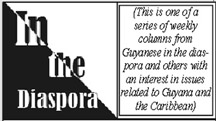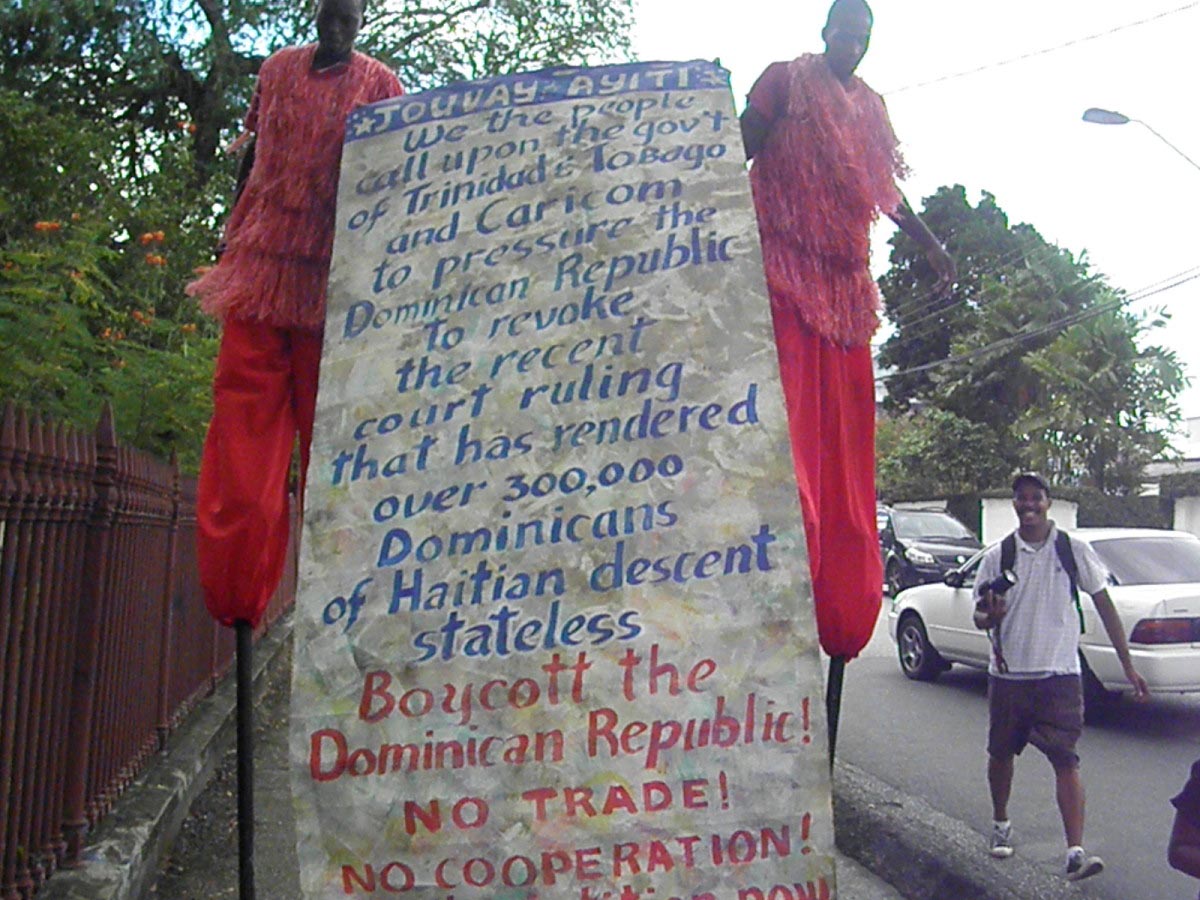By The Clement Payne Movement, Barbados
The ‘Clement Payne Movement’ was founded in Barbados in 1988 by David Commissiong along with such colleagues as Trevor Prescod, Sally Comissiong, the late Martin Cadogan, Joy Workman, Onkphra Wells, David Denny, Gregory Noel, and the calypsonian Herring among others. Over the years this organization has accomplished a number of breakthroughs in Barbados and the Caribbean, including the elevation of Clement Payne ( a heroic labour leader of the 1930’s) to the status of a national hero of Barbados; the celebration of Emancipation Day as an official public holiday in Barbados; the implementation of some modicum of black or African studies in the school system of Barbados; and the continuing of Caribbean opposition to aspects of American imperialism such as the economic blockade of Cuba.
Note by Alissa Trotz, Editor of In the Diaspora:
Last week, the Jamaica Observer reported the outrageous news that the Order of Excellence was conferred upon President Danilo Medina Sánchez, President of the Dominican Republic (DR), who also presented Jamaican Prime Minister Andrew Holness the Order of Merit of Duarte, Sánchez and Mella in the rank of Grand Cross with Gold Breast. To put it bluntly, this national honour has been awarded by a Caricom country to the President of the Dominican Republic who just four short years ago defended a Supreme Court judgment effectively removing the possibility of citizenship for Dominicans of Haitian heritage, a ruling that went as far back as 1929.
What short memories we have.

This is not Jamaica’s business alone – we should all speak up and out against the travesty of awarding national honours in the face of ongoing and openly anti-black racism being perpetrated in the name of Dominicans by the Dominican state. Where is the damned shame? The term of the current chair of the Caribbean Community, Prime Minister of Grenada Keith Mitchell, comes to an end in December, and the incoming chair is the President of Haiti Jovenel Moïse. How do we ensure that this continuing outrage against Haitians and Dominicans of Haitian heritage is firmly on the Caricom agenda? It is high time and beyond time that we in the region put this continuing eyepass to an end, reflected not only in this shameful national honour but in the ongoing restrictions of Haitian movement within CARICOM countries of which it is a full member, and the profiling and harassment that takes place, from The Bahamas to Guyana. As calypsonian David Rudder eloquently puts it, Haiti, I’m sorry, we misunderstood you. One day we’ll turn our heads, and look inside you.
***
Over the past two years, the Government of the Dominican Republic has orchestrated and /or presided over the mass deportation to neighbouring Haiti of close to 200,000 dark-skinned residents of the Dominican Republic. These persons (men, women and children) were selected for deportation on the ground that – even though they might have been born in the Dominican Republic – they are the children of so-called undocumented Haitian migrants and are therefore not eligible for Dominican citizenship.
This recent chapter in the troubled relationship between the white and mulatto establishment of the Dominican Republic and its black native sons and daughters of Haitian ancestry began on the 25th of September 2013— the date on which the Constitutional Court of the Dominican Republic decreed that some 300,000 dark-skinned persons born in the Dominican Republic of Haitian parentage were to be stripped of their Dominican citizenship and the rights that go with it.
According to the Constitutional Court, such people were to be considered “persons in transit” even if they were born in the Dominican Republic and had lived there all their lives. The Court also ordered the Dominican Government to review the birth and citizenship records of all persons going back to the year 1929; to cancel the citizenship of all those whose parents had been undocumented immigrants from Haiti; and to deport them.
This ruling of the Constitutional Court received widespread condemnation from a variety of governments, hemispheric organizations such as the Caribbean Community (CARICOM) and the Organization of American States (OAS); international courts like the Inter-American Human Rights Commission and the Inter American Court of Human Rights, and by international human rights advocacy bodies such as Amnesty International. Indeed, so trenchant was the criticism and denunciation that the government of the current president of the Dominican Republic, Danilo Medina, felt compelled to pass a new law which purported to soften the barbarity of the Constitutional Court’s ruling by stipulating that if the targeted persons voluntarily presented themselves to the relevant governmental authorities and applied for (and were granted) registration as “foreigners” within the Dominican Republic that they would not be deported.
Needless to say, this “new law” was also roundly condemned by international human rights bodies for continuing the policy of stripping native-born dark-skinned Dominicans of their citizenship status and rights. Indeed, the Inter-American Court of Human Rights (the Judicial organ of the OAS) actually ruled that both the decree of the Constitutional Court and elements of the “new law” were illegal and null and void.
Sadly, but predictably, the Constitutional Court of the Dominican Republic responded by arrogantly declaring that the Dominican Republic’s accession to the jurisdiction of the Inter American Court on Human Rights had been an unconstitutional act, and that the Inter American Court therefore had no jurisdiction in relation to the actions of the Government of the Dominican Republic.
The ultimate result of these legal machinations was that some 300,000 Black people of Haitian descent were effectively deemed non-citizens of the Dominican Republic and became, in effect, “stateless”persons. Many, if not most, of these people know little or nothing about Haiti – they were not born in Haiti; are not citizens of Haiti; do not speak French or Haitian Kreyol, and do not possess family networks in Haiti to whom they can connect.
And so it was against this background that in 2015 the Government of the Dominican Republic quietly commenced a mass deportation programme. Over the past two years, dark-skinned Dominicans of Haitian ancestry have been subjected to a reign of terror, as white and so-called mulatto Dominican Police and military personnel have targeted their homes and places of work, arresting suspected “persons in transit” and transported them to the border for immediate deportation to Haiti. In addition to such “official” deportations, there has also emerged the phenomenon of “unofficial” deportations. This phenomenon consists of armed gangs of civilians – known as “tigerres” – who take it upon themselves to violently apprehend and “deport” dark-skinned persons suspected of being of Haitian ancestry.
This mass deportation programme has been so heartless and barbaric that the International Organization for Migration has reported that thousands of unaccompanied minors have simply been deposited over the border with Haiti.
As indicated above, many of the deportees have no family support structures in Haiti, and this has resulted in the establishment of several extremely poorly-resourced refugee camps on Haitian territory to house such deportees.
Bear in mind that the Haitian authorities – still struggling with the devastating effect of the 2010 earthquake and of more recent hurricanes – is in no position to provide for these refugees. And the predictable outcome has been the outbreak of Cholera in several of these camps.
But as bad as the situation is now, it has the potential to get worse – much worse!
All of us in the Caribbean would be well advised to take cognizance of the fact that this governmental crackdown on the Black people of the Dominican Republic is occurring in a country that has long exhibited deeply rooted traits of extreme anti- Black and anti-Haitian racism. And it should be noted that the last time there was a governmental crackdown of this magnitude against people of Haitian ethnicity in the Dominican Republic – the 1937 crackdown by President Rafael Trujillo – close to 30,000 black people of Haitian ethnicity were massacred. It is this type of scenario that responsible and right-thinking members of our Caribbean community must take urgent steps to forestall.
It goes without saying that this heartless and noxious policy of the Dominican government offends several of the most important principles of International Law.
Ever since the enunciation of the Universal Declaration of Human Rights in 1948, with its ringing pronouncement that “everyone has the right to a nationality” and that “no one shall be arbitrarily deprived of his nationality”, and the establishment of the International Convention on the Status of Stateless Persons in 1954, International Law has taken a stance against any measures that throw people into a state of “statelessness”.
An important International Law measure to avoid “statelessness” is to provide nationality to children born on a country’s national territory, in circumstances in which such children would otherwise be stateless. This norm is stipulated in the 1961 United Nations Convention on the Reduction of Statelessness. It also appears in several regional human rights treaties, including the American Convention on Human Rights, the European Convention on Nationality, and the African Charter on the Rights and Welfare of the child.
The ruling of the Dominican Republic’s Constitutional Court and the so-called “new law” of President Medina’s government therefore go against the grain of this entire trend of International Human Rights Law. The ruling also offends the well-known legal principle that prohibits the retroactive application of legislation. The Constitutional Court’s ruling is actually based on a 2010 law which it has interpreted in such a manner that it is given a retroactive application going back as far as 1929. This is clearly morally, ethically and legally wrong.
The time has come for us to say enough is enough. The people of Haiti have suffered oppression and discrimination for far too long. We have also had too many centuries and too many manifestations of anti-Black racism. It must all stop now. Let us do what is necessary in this case to demonstrate an attitude of zero-tolerance of all manifestations of anti-Black racism.






